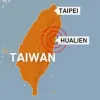The repercussions of this natural disaster stretch far beyond the immediate danger and destruction caused in Taiwan. They extend to the potential for significant disruptions within the global technology supply chain, particularly concerning the production of semiconductor chips. Taiwan is a critical hub for this industry, home to giants like the Taiwan Semiconductor Manufacturing Company (TSMC) and United Microelectronics Corporation (UMC). Both companies had to evacuate some of their facilities as a safety measure, interrupting their operations. While this is a common practice in such situations, it brings to light the real risk of halting chip production. Since these companies play a pivotal role in supplying the world with semiconductor chips, any delay in their production has the potential to influence the availability and cost of electronic components and gadgets worldwide.
TSMC specifically reported an anticipated production setback of about 6 hours due to the quake. Fortunately, the main facilities of both TSMC and UMC are situated on the western coast of Taiwan, farther from the quake's epicenter, which could lessen the overall impact on their operations. However, it's important to remember that even short-term interruptions can have considerable effects on the market. For instance, following the 1999 quake, there was a sharp increase in the prices of DRAM modules, by more than 25%.
This recent earthquake in Taiwan highlights the fragile nature of the global technology supply chain, particularly how it's susceptible to natural disasters occurring in crucial manufacturing regions like Taiwan. The event serves as a reminder of the interconnectedness of global industries and the far-reaching consequences that a natural disaster in one part of the world can have on global markets and industries.
Here some videos posted at reddit. My heartfelt support goes out to all those affected by the earthquake in #Taiwan.


